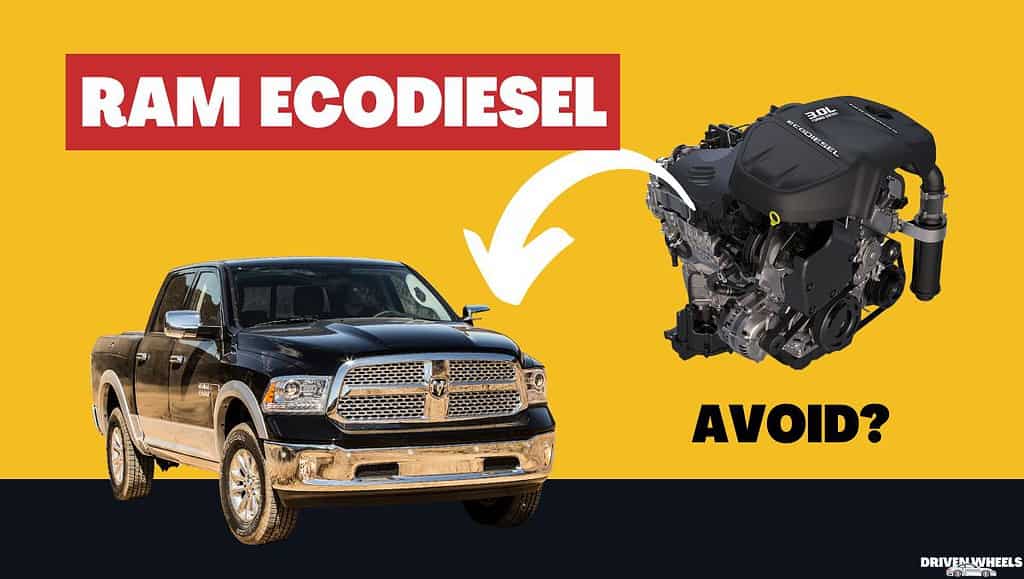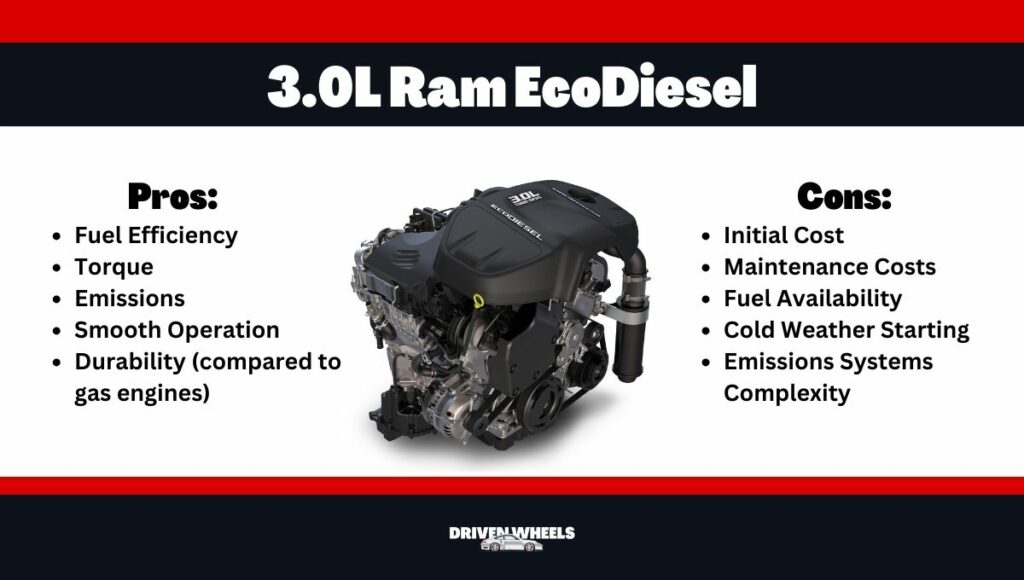Ram EcoDiesel Years to Avoid: A Buyer’s Guide to Smart Picks

The American automotive scene has consistently delivered a diverse array of trucks, tailored for everything from the heavy-lifting job sites to leisurely cruises down open roads. Opting for the right pickup is pivotal, ensuring it aligns with your requirements.
Whether that’s towing strength, comfort, or the capability to tackle rugged terrain.
Recognizable amongst its peers, the Ram EcoDiesel has carved out a reputation for dependability. The term EcoDiesel signifies a blend of enhanced performance and fuel economy, a testament to the evolving technologies that grace the auto industry.
Despite the general reliability, certain models have surfaced with notable issues—knowledge that could prove invaluable when selecting a model that circumvents the commonly encountered hassles.
Frequent Issues with Ram EcoDiesel Engines
EGR Cooler Complications
The EcoDiesel’s EGR cooling system is prone to leaking antifreeze and can suffer from cracks, predominantly in older models. These faults are often due to thermal strain and could result in serious damage, including engine fires, if not addressed swiftly.
Regular check-ups can prevent extensive damage from these kinds of leaks.
Issues with Starting Heaters
Starting problems in your Ram EcoDiesel might be due to faulty glow plugs, recognizable by a clicking sound without the engine turning over. Damaged plugs can also cause white smoke and fuel leakage.
Ensuring electrical components are in good condition can help mitigate these challenges.
Faulty Fuel Injection System
Users have reported issues with fuel injection in older Ram EcoDiesel engines, such as frequent maintenance requirements after reaching a mileage of 100,000. Substandard fuel injectors and pumps could be the culprits here.
A regular maintenance schedule is crucial to keep these components functioning properly.
Turbocharger Failures
Turbo failure can be a complex issue stemming from oil leaks, bearing wear, and part deterioration. These problems can build up to significant turbocharger issues that come with a hefty repair bill.
Regular inspections can help catch early signs of turbo wear before full-blown failure occurs.
Issues with the Oil Cooling System
Overheating and misuse can lead to a dysfunctional oil cooler, allowing oil to contaminate the coolant system. This can drastically shorten your EcoDiesel engine’s lifespan and lead to further engine complications.
Making sure your driving is consistent with your vehicle’s limits can help preserve the cooler’s condition.
Timing Chain Woes
Timing chain issues have been noted, especially when there’s accidental slippage due to varied piston and valve timings. Such a slippage might not damage valves immediately but can be costly to correct.
Be on the lookout for unusual engine sounds that might indicate timing chain issues.
TIPM Electrical Problems
The TIPM in many Ram models can malfunction, leading to a host of electrical problems like inoperative power windows and A/C systems.
Awareness of how these systems are performing is key to spotting TIPM issues early on.
Exhaust Coupler Leakage
Models from 2014 and 2015 have exhibited exhaust coupler leaks, which might allow diesel fumes to enter the cabin. These leaks arise due to defective couplers that can’t withstand exhaust gas temperatures.
If you notice diesel odors inside your truck, it could be a sign of this issue, and you should have it checked out immediately.
Ram EcoDiesel: Model Years to Avoid

Troublesome First Year: 2014 Ram EcoDiesel
Model Year 2014: The initial offering of the EcoDiesel engine in this model year saw its fair share of hiccups. The transmission particularly had difficulties meshing with the novel engine, leading to a variety of woes.
Drivers encountered unexpected shifting out of drive, excessive noise during startups and at low speeds, a lack of acceleration despite revving RPMs, and jolts during brake release or speeding up.
While these problems might seem minor at first glance, they’re warning signs that could signal premature transmission failure.
Persistent Issues: 2015 Ram EcoDiesel
Model Year 2015: This year’s model also demanded caution due to persistent reliability issues, with recalls encompassing electrical systems, transmissions, engines, and fuel systems.
Owners faced frustrating glitches like a faulty GPS/UConnect system, non-responsive radios, dashboard alert malfunctions, and screens going blank. These elusive troubles often returned even after supposed fixes, leaving both owners and technicians perplexed and at odds with a lasting solution.
Recurring Setbacks: 2016 Ram EcoDiesel
Model Year 2016: The 2016 iteration persisted with engine concerns and introduced a flawed rear tailgate latch on select power lock-equipped vehicles.
Owners also reported malfunctions with the transmission’s shifter linkage, unpredictable cruise control, and problematic airbags.
Despite addressing certain issues from past years, the 2016 model remained burdened by significant drawbacks worth considering before purchase.
Optimal Ram EcoDiesel Model Years
If you’re in the market for a Ram EcoDiesel, consider these years as they boast fewer issues and garner minimal owner complaints:
- 2017: Known for an exceptionally smooth ride and top-notch cabin quality.
- 2018: Continues the trend of reliability with a few improvements over the previous year.
- 2019: A great pick with a proven track record for lesser maintenance needs.
- 2020: Stands out with robust performance and an enduring design.
- 2021: Offers a significant torque boost with 480 lb-ft and impressive towing capability.
- 2022: Maintains the legacy with solid performance and dependability.
The 2017 model could be your companion for hauling tasks, thanks to its revered suspension. When inspecting these trucks, focus on their cabin quality and the 8-speed automatic transmission, which many praise for its smooth operation.
For the 2021 model year, the 3.0L EcoDiesel V6 engine brings you substantial towing power up to 12,560 pounds, not to mention the ample 260 horsepower under the hood. Also worth noting is the payload capacity of 2040 pounds, making it suitable for your considerable hauling needs.
When examining these trucks, check for a solid integrity of the body, comfortable interiors, and reliable electrical systems, as improvements in these areas have been a focus for recent Ram 1500 models.
Your satisfaction with one of these dependable vehicles is likely just a dealership away.
Evaluating the Ram EcoDiesel’s Value
When considering the Ram EcoDiesel, its longevity outshines many gasoline engines. You’re promised peace of mind with a three-year, 36,000-mile basic warranty and an even more reassuring five-year, 100,000-mile powertrain warranty.
Fuel efficiency is commendable; expect an average of 22 city mpg and an impressive 32 highway mpg.
Adhering to routine fluid checks and maintenance schedules could lead to your EcoDiesel surpassing 200,000 miles.
Furthermore, this model boasts compatibility with various packages and sets, ensuring a customized and satisfying driving experience.
- Longevity: Higher mileage potential compared to many gasoline engines
- Warranty: Starts with 3 years/36,000 miles basic, extends to 5 years/100,000 miles on powertrain
- Fuel Economy: Up to 22/32 mpg (city/highway)
Equipped with an eight-speed TorqueFlite transmission, the EcoDiesel delivers smooth shifting across all speeds.
When you’re behind the wheel, the robust presence on the road, the quiet cabin, and the solid towing capabilities will genuinely enhance your driving experience.
Ram 3.0 EcoDiesel Dependability
- Longevity: Approximately 200,000 to 300,000 miles
- Maintenance: Essential for reliability
- Comparison: Outperforms gas engines in lifespan
Prioritize scheduled care to ensure your Ram 3.0 EcoDiesel outlives traditional gas engines. Enjoy extended journeys with confidence.
Troubles with the 3.0 EcoDiesel
- Coolant leaks: Potential fire risk.
- EGR (Exhaust Gas Recirculation) failure: Affects performance and emissions.
- Timing chain wear: May occur prematurely, leading to costly repairs.
